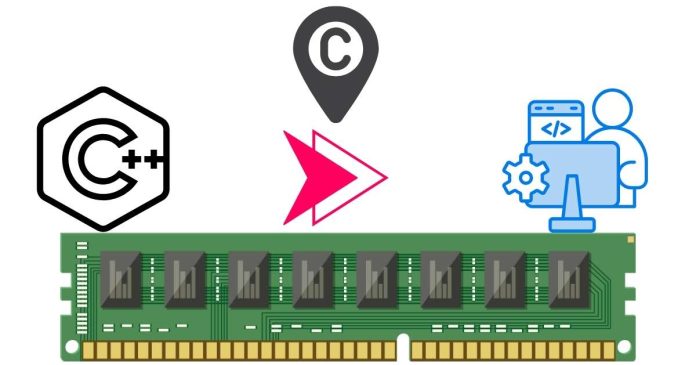In C++, pointers are one of the most powerful and versatile features of the language. They provide the ability to directly manipulate memory and are essential for advanced programming tasks such as dynamic memory allocation, working with data structures like linked lists, and enhancing performance.
This article will explain what pointers are, how they work, and why they are useful.
Definition of a Pointer
A pointer is a variable that stores the memory address of another variable. Instead of holding the actual data, a pointer points to the memory location where the data is stored.
Syntax of a Pointer:
data_type* pointer_name;
data_type: Specifies the type of the variable the pointer will point to.*: Denotes that the variable is a pointer.pointer_name: The name of the pointer.
Example of a Pointer
Here’s a simple example of how pointers work in C++:
#include <iostream>
using namespace std;
int main() {
int number = 10; // Regular variable
int* ptr = &number; // Pointer storing the address of 'number'
// Output
cout << "Value of number: " << number << endl; // Prints 10
cout << "Address of number: " << &number << endl; // Prints the memory address
cout << "Value stored in pointer (address): " << ptr << endl; // Prints the memory address
cout << "Value pointed to by pointer: " << *ptr << endl; // Prints 10
return 0;
}
Output:
Value of number: 10
Address of number: 0x7ffee2bce8c4
Value stored in pointer (address): 0x7ffee2bce8c4
Value pointed to by pointer: 10
How Pointers Work
- Memory Address: Every variable in C++ is stored at a unique memory address. Pointers allow us to access and manipulate this address.
- Referencing (
&): The&operator is used to get the memory address of a variable. - Dereferencing (
*): The*operator is used to access or modify the value stored at the memory address a pointer points to.
Declaring and Initializing Pointers
To declare a pointer, use the following syntax:
data_type* pointer_name = &variable;
Example:
int a = 5;
int* p = &a; // 'p' is a pointer to the integer variable 'a'
Why Use Pointers?
Pointers are essential in C++ for several reasons:
- Dynamic Memory Allocation: Pointers are used with
newanddeleteto allocate and deallocate memory dynamically.int* ptr = new int; // Dynamically allocate memory *ptr = 25; // Assign value delete ptr; // Free memory - Efficient Array and String Handling: Pointers can be used to iterate through arrays or modify strings efficiently.
- Pass-by-Reference: Pointers allow functions to modify variables outside their local scope by passing their addresses.
void updateValue(int* ptr) { *ptr = 20; } - Building Complex Data Structures: Data structures like linked lists, trees, and graphs heavily rely on pointers for their implementation.
- Low-Level Programming: Pointers provide control over memory, enabling tasks like memory-mapped IO, operating system development, and embedded systems programming.
Common Pointer Operations
Here are some common operations you can perform with pointers:
| Operation | Description | Example |
|---|---|---|
| Assigning an Address | Assigns the address of a variable to a pointer | int* p = &x; |
| Dereferencing | Accesses the value at the memory address a pointer points to | int y = *p; |
| Pointer Arithmetic | Moves the pointer to the next or previous memory location | p++; or p--; |
| Null Pointers | Pointers that do not point to any valid memory location | int* p = nullptr; |
| Void Pointers | Generic pointers that can point to any data type | void* p; |
Special Types of Pointers
- Null Pointer: A pointer that points to nothing. Use
nullptr(C++11 and later) orNULL.int* ptr = nullptr; - Void Pointer: A generic pointer that can store the address of any data type.
void* ptr; int a = 10; ptr = &a; // Valid - Function Pointer: A pointer that points to a function, allowing dynamic function calls.
void display() { cout << "Hello"; } void (*funcPtr)() = display; funcPtr(); // Calls display() - Dangling Pointer: A pointer that points to a memory location that has been freed.
int* ptr = new int(5); delete ptr; // Now 'ptr' is a dangling pointer
Common Mistakes with Pointers
- Uninitialized Pointers: Always initialize pointers to avoid undefined behavior.
int* ptr = nullptr; // Safe initialization - Memory Leaks: Forgetting to free dynamically allocated memory leads to memory leaks.
int* ptr = new int; delete ptr; // Always free memory - Dereferencing Null Pointers: Accessing a null pointer results in a runtime error.
int* ptr = nullptr; cout << *ptr; // Error!
Pointers are a fundamental feature of C++ that give programmers low-level control over memory. While they can be complex and error-prone for beginners, mastering pointers opens up a wide range of possibilities for creating efficient and flexible programs. Whether you’re dealing with dynamic memory, data structures, or advanced algorithms, pointers are an indispensable tool in C++ programming.


